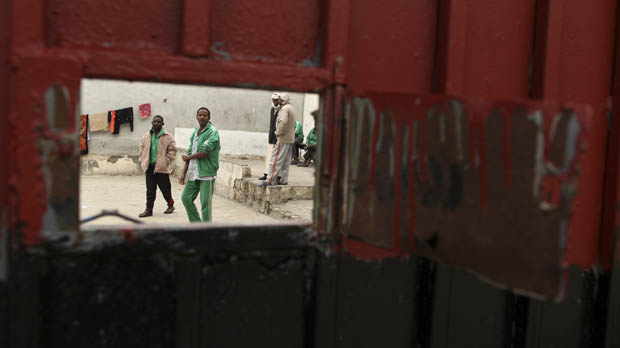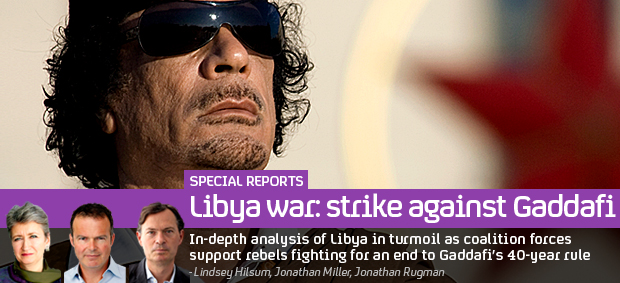‘Thousands illegally held in Libya,’ says UN chief
Thousands of people are being illegally jailed and abused by Libya’s ex-rebels, a UN report says. Channel 4 News speaks to a Ghanaian woman who has seen friends detained or die trying to flee Libya.

The report, which will be presented to the UN Security Council on Monday, warns of “disturbing reports” that war crimes had been committed by both sides during the civil war.
But Ban Ki Moon warned that torture and abuse is still widespread under Libya’s new government, which has not transferred detainees from militia control to the state.
He said that “while political prisoners held by the Gaddafi regime have been released, an estimated 7,000 detainees are currently held in prisons and makeshift detention centres, most of which are under the control of revolutionary brigades.”
Many of these prisoners, the secretary general said, are being held without charge and have been mistreated in the absence of a functioning police and judiciary.
He said that black Africans have been targeted because of their skin colour, that women are being held by male guards, and that children are being detained alongside adults.
Sub-Saharan Africans accounted for “a large number” of the detainees, Ban said, while members of Libya’s Tawerga community had faced reprisals, including revenge killings, for their role in attacks by Gaddafi forces on the city of Misrata.
The plight of black Africans in Libya
Channel 4 News spoke to Margaret, a Ghanaian national living with other west African nationals in squalid conditions on the outskirts of Tripoli.
Margaret, a housekeeper who has lived in Libya for more than 10 years, said that some of her friends had met terrible fates in the weeks since Tripoli fell to NTC rebels.
Some, she said, had been wrongly accused and detained by the rebels of being hired guns of Gaddafi. Others, passport-less and scared of suffering similar treatment, had tried and, tragically, failed to leave Libya by the only way they knew how: on the treacherous Medditeranean waters towards Malta or Italy.
“Three of my good friends, two from Ghana and one from Niger, were beaten up and taken away by the rebels when they were trying to look for work about one month ago,” she said.
“They said to them: ‘You are with Gaddafi, we know you were with Gaddafi. You are animals.
“They took them to Janzour (a Tripoli suburb which has a detention facility) and we heard that they were treated very badly. They were whipping them and kicking them.
“They were not with Gaddafi, they were [construction workers].
“They have not left our village for many months because it is too dangerous. We said to the people, you must let them go, but they told us ‘no’.
“When we checked last week, they were not in Janzour anymore. We don’t know where they are now, if they have been moved somewhere else, or whatever.”
Margaret said that “at least” ten other friends of hers, all Ghanaians, had all attempted to negotiate the choppy Mediterranean Sea on ramshackle boast and dinghys in the direction of either Malta or Italy.
“One or two had got there,” she said. “The rest of them did not.”
Every year an estimated 1,000 economic migrants die whilst crossing the Mediterranean.
And the Italian government has repeatedly warned that the conflict and aftermath in Libya could create massive levels of migration towards Italy.
“Nobody would give them their passports back so they could go home to Ghana. They did not want to be taken to jail or shot, and they needed to find work,” Margaret said.
“Some Good Samaritans have helped us with food, but only just enough to live on.
“So they tried to go to Italy, but the boat drowned,” she said.
Sirte
In Sirte, Gaddafi’s birthplace where he made his last stand, there were “disturbing reports that killings amounting to war crimes were committed by both sides”. Libya’s new authorities have announced an inquiry into Gaddafi’s death.
While Gaddafi employed some fighters from neighbouring countries as mercenaries, other Africans worked in civilian jobs in the oil-rich North African country. Human rights groups have charged that some rebels made no distinction between the two.
The ruling National Transitional Council had made some moves to transfer detainees to state control but “much remains to be done to regularise detention, prevent abuse and bring about the release of those whose detention should not be prolonged,” Ban Ki Moon said.
Libya’s acting justice minister said he will consult with Ban Ki Moon over the findings.
